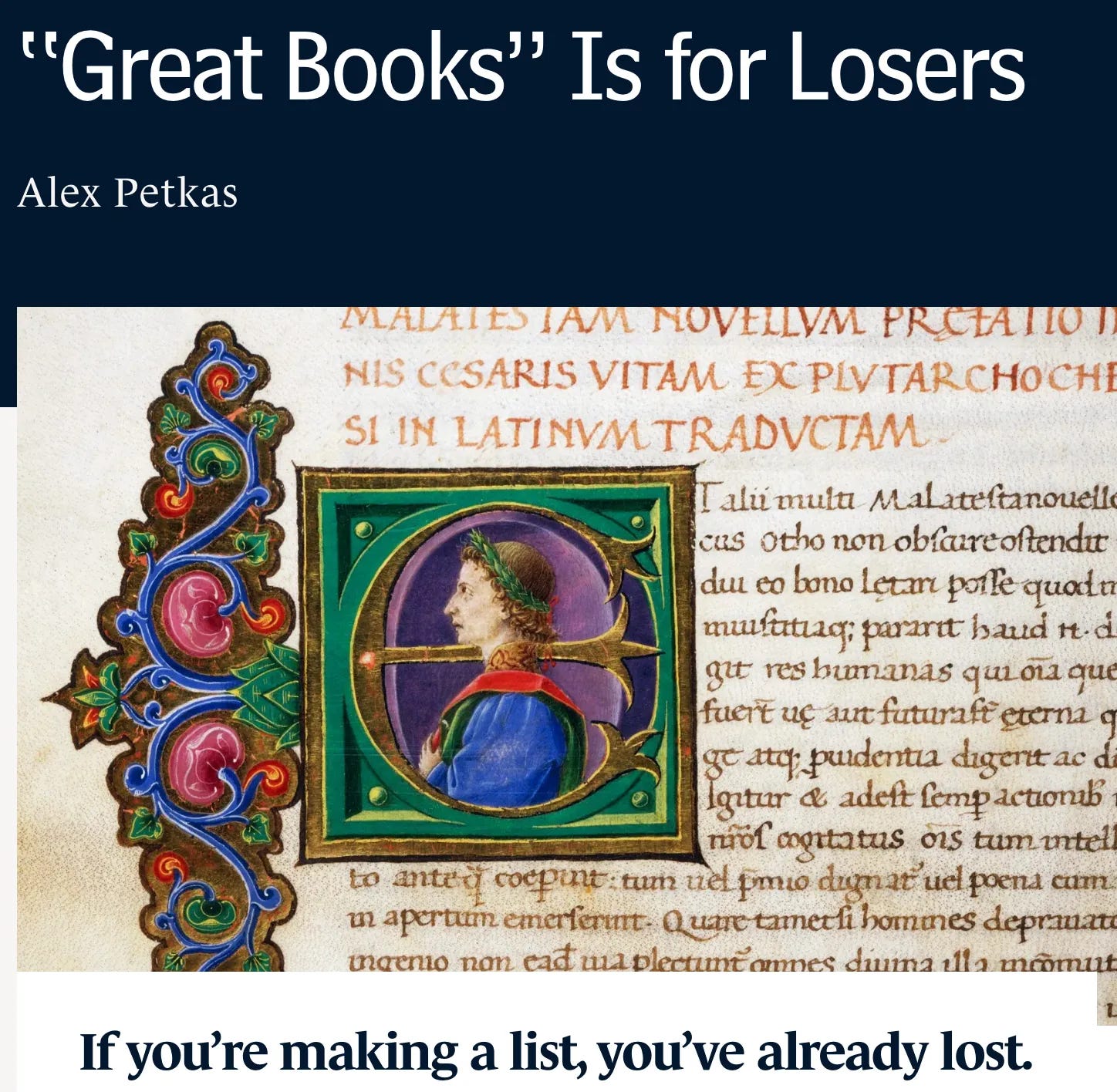I recently wrote a piece for American Mind, featuring some strong opinions on the future of education in the USA. But I didn’t elaborate much on the practical upshot of my argument, so I’ll do so here below.
[Apologies if you’re getting this for the second time, there was a delivery issue]
The Criticism
Admittedly, I resorted to a provocative title: “‘Great Books’ is for Losers”. Many were indeed provoked; some became less so once they actually read the article. But I stand by my position that this model of education (and self-education) deserves to be challenged.
By “Great Books,” I had a specific, early-mid 20th century project in mind, which has snowballed into a powerful, yet somehow rather amorphous, brand. By calling its creators (and wishful devotees) “Losers” I mean that the “Great Books” model of education (“Plato to NATO”) was developed as a sort of watered down cope for the loss of the classical (and Renaissance) model for the humanities. A very real battle for the soul of American culture was definitively lost, and the “Great Books” paradigm allows many to to imagine, falsely, that they are getting it back.
In other words, the idea I question is not simply that “great books are worth reading” (nobody really disagrees with that). Rather, I correct the notion that a list of Great Books is what constituted the humanities or “liberal arts” education of so many great historical figures we admire.
The “Great Books” model (as defined in the article) is not the education the US Founders generally received, nor did a great list of diverse philosophers like Aquinas, Rousseau, Nietzsche, etc. get it, nor famous literary authors like Shakespeare, Racine, and Stendahl
A “Great Books” focused curriculum generally emphasizes “ideas” or even “critical discussion”, and tends thus to make a centerpiece out of what would be fringe notions, of doubtful utility, in the eyes of the ancients. That doesn’t mean it’s useless by any means, but it’s not classical.
The Solution
We have a lot to gain by taking seriously the tradition we lost. I try to point in this direction in the article:
The “humanist” model itself was not invented in the Renaissance, but based largely on the paradigms of education forged in the ancient Greek and Roman schools of oratory, attended by the likes of Demosthenes, Cicero, and Caesar. It was an education founded emphatically and rigorously on the bedrock of imitation—mimesis in Greek, carried roughly into Latin as aemulatio, or the “emulation” of role models. This was an education for statesmen. In the past, it went by another name, which has become in our day so debased as to be unrecognizable: rhetoric, the “speaker’s art.”
It’s not because they were trying to turn back the clock on history that Renaissance humanists and the US Founding generation turned to the classics. Rather, they wanted to optimize their mental formation for producing greatness, in the present and future.
The criterion for inclusion in this “canon” has little to do with “ideas,” and is more akin to the Homeric concept of aretē, understood as frightening manly excellence. Indeed, it is less a canon of “Great Books” and more a canon of “Great Men” worth imitating. That their words and deeds are recorded in books is virtually accidental to the concept. The whiff of this thought world is still detectable in both the prose and the actions of men like Hamilton and Napoleon. It was this paradigm that made not Virgil, not Catullus, not Plato or Aristotle, not even Caesar, but the mimesis-obsessed Parallel Lives of Plutarch the most popular ancient book (besides the Bible) in the American colonies.
It would need an additional article, nay, a book length study, to outline what I propose as the alternative.
But that would be boring.
(I’ve already published a number of academic pieces on the ancient education system and literary culture if you want to hunt any of that down.)
Instead, I’d rather put my proposals into practice with the Cost of Glory.
Check out our upcoming Men’s Retreat in Austin, TX, for example:
(Space is very limited so apply soon)
Cost of Glory listeners get a $200 discount - you’ll receive the code after filling out an application.
Cato 1 is Live
Transcript coming soon. Also, Part 2 coming soon.
Shout outs
A selection from among many thoughtful responses on Twitter / X to my article:
By my friend Dcn. Harrison Garlick of Ascend: The Great Books Podcast
https://x.com/TheGreatB00ks/status/1858964624927797602
Techno-Philosopher Brendan McCord:
https://x.com/mbrendan1/status/1858969064053620752
Master Poaster
:https://x.com/ChivalryGuild/status/1858881733426336102
Other Appearances
Had a great convo on the Roman and American aristocracies with Will Tanner of American Tribune.
Stay Ancient,
Alex






For my 7,000 word response to this, pushing back, but quoting Petkas’s fine prose at length to better illustrate the issue, see here: https://pomocon.substack.com/p/great-lives-and-languages-vs-great